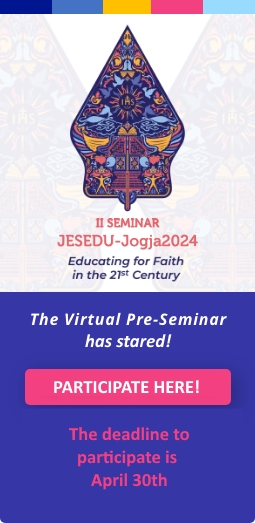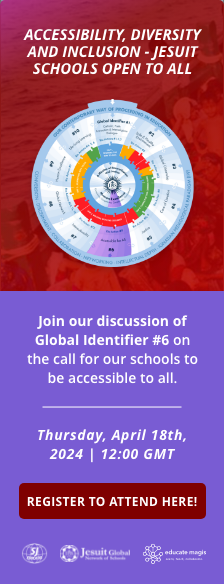I am Caterina Lizzio, an English Literature Teacher and Responsible for Global Citizenship Education at Istituto M. Massimo, in Rome, Italy. In this article I would like to share the challenges and advantages I have encountered on our new online teaching and learning set up.
Imagine you wake up one day and you are told you are going to spend the next 2 months (or more) locked in a golden prison: your house. How would you react?
If some months ago someone had told me I was going to have a long period of smart working from my comfortable living-room, I would have thanked God for the amazing opportunity!
No waking up too early in the morning, no traffic jam, no parking problems, no carrying books and PC up and down the steep stairs of my school and across its never-ending corridors, no more stress… in other words: a Heaven on Earth!
But sometimes from dreams to nightmares it is but a short step. So here we are, in quarantine, that is to say locked in our houses, without the slightest possibility of peeping out to breathe some fresh air and have a talk with the neighbours, not to mention perform all the usual day-to-day tasks.
Worse than a hypothetic WWIII, Covid-19 is an appalling sneaky enemy, one of those you cannot easily defeat, a greedy element which feeds himself on our lives, never having enough.
The first days we were disoriented, but having to face the Hamletic Doubt: “Whether ’tis nobler in the mind to suffer The slings and arrows of outrageous fortune, Or to take arms against a sea of troubles, And by opposing end them”[1], we soon realized there was no room for mourning: we took arms!
In Italy we are not so used to online learning, but we are quite good at making the best of the situations, so every school has started making plans to face it all.
To start with, I have immediately contacted my department colleagues (English language and Literature) and my students, either by mail or through the tools offered by our online register; but it was not enough.
Fortunately thanks to our institutional school accounts, we have been offered the possibility of using, among others, Google Classroom and Google Meet. The former allows you to create your virtual class with your students, the latter helps you connect live with your classes.
In this new virtual environment I have seized the opportunity of connecting with my colleagues and students daily, trying to recreate a sort of ordinary interactive routine.
Advantages? For sure! I can apply the flipped classroom approach: first I choose materials to upload on Google Classroom, then I ask students to read or view them, before getting back into our Meet classroom to introduce new historical and literary periods as well as outstanding authors with their masterpieces.
Regardless of some technical problems, we can make the lesson together as usual, with a double positive outcome: first things first, girls and boys are called to jump back to ‘normal’, keeping in touch with each other and with teachers, which represents their daily practice, and they can continue learning not only concepts, but how to reinvent their lifestyle, to face new challenges, to use all their potential to react to awful circumstances.
Isn’t it a huge Reality Task[2]? One of those we have always tried to recreate, so to test them in class on real life issues, asking them to prove how skilled they are on team working, problem solving, creative thinking, and so on?
In some of my classes students have also organized small groups for “remote team working” aimed at presenting authors and their literary production, contextualizing them politically, historically and literately.
Another activity I proposed to my classes (the two ones likely to sit the final State Exam in June) was the last act of a project started in September, that I had to modify for contingent reasons. The project, titled “An eye on the future with a foot in the past: resilience and comprehensive solutions”, is about the importance of memories and experience to develop the right “tools” to holistically face the present challenges, being resilient and thinking globally.
After studying together the majority of the authors, masterpieces and events of the Age of Anxiety – Modernism, after analyzing some specific points of Pope Francis’s encyclical letter “Laudato si’”, I asked them to research information about Covid-19 and its effects on the society.
Finally they had to write an essay to highlight similarities between epochs, verify the influence of historical events on social conditions, to express their opinion concerning the fact that, due to a world holistic vision, we require a new kind of universal solidarity as, to face problems, it is essential to seek comprehensive solutions.
They are still sending their works and I can say, having already read some of them, they have hit the target!
I know it may sound like a paradox, a non-sense, but we all are closer now than we have been till a month ago. We are focusing on one objective: staying alive fighting against a common enemy.
This gives us and our students the necessary strength to continue thinking positive, taking advantage of the situation, turning it into an opportunity for us all.
To sum up, it is true: “mala tempora currunt, sed peiora parantur”[3]. But instead of surrendering, of behaving like losers even before having tried to play, let’s get into the game, support each other, think positive and show our students we master the 4Cs that shape them as Ignatian students: to be Competent, of Conscience, Committed and Compassionate. Add a little bit of Christian Optimism and #everythingwillbefine. After all, “if winter comes, can spring be far behind?”[4]
[1] W. Shakespeare, Hamlet
[2] In Italy we call “Compito di Realtà” – Reality Task – a practical feasible work, a complex task student have to face in order to be tested on many abilities at the same time.
[3] M. T. Cicerone. Translation: ‘Bad times are upon us, but the worst is yet to come’.
[4] P. B. Shelley, Ode to the West Wind

